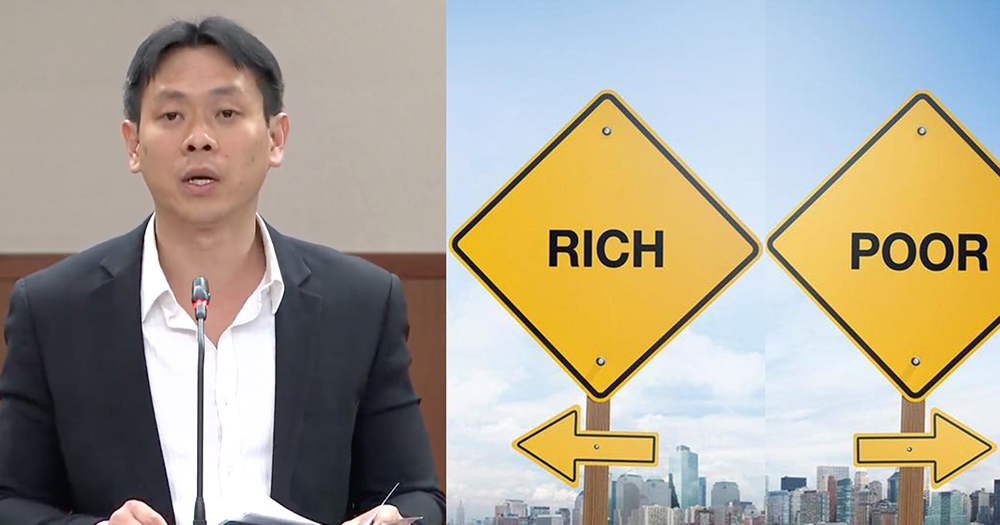Streaming in secondary schools has contributed to the stratification of society.
This was the thrust of the speech made by Nee Soon GRC Member of Parliament (MP) Louis Ng on Feb. 26 at the Budget Debate 2019.
Ng said that the students of the Normal stream were usually from a lower socioeconomic status compared to the Express stream, which resulted in reduced social mixing and hardened social stratification.
Ng wanted the government to "completely replace streaming with subject-based banding", especially since the model was already introduced in primary schools where subjects are offered to students at either the standard or foundation level, depending on their strengths and weaknesses.
Ng said that it "really is time to slain this sacred cow".
Ng's radical call to change the secondary school streaming system may be influenced by Education Minister Ong Ye Kung's recent remarks to the media on Feb.17.
Ong told the media that there will be measures announced soon to "significantly improve" the education system.
Subsequently, Ong, in a written response to Ng on whether MOE has studied the effects of streaming on secondary school students' self-esteem and confidence, said that "the trade-off between customisation and stigmatisation is something we need to recognise".
Limited inter-stream mobility
Ng elaborated that much of this had to do with limited inter-stream mobility, with psychological barriers as a primary cause of such limitations.
Citing MP Intan Azura Mokhtar's statement that academic streaming had a tendency to pigeon-hole students and place expectations on their own capabilities, Ng stated that for some students, being in the Normal Stream carried a strong stigma.
Ng also cited a 2006 research paper titled "Building Teacher Capacity In Curriculum And Pedagogical Design In Normal Technical Classrooms", adding that Normal students could have internalised negative perceptions of themselves.
Such perceptions, as Ng quoted directly from the paper, were stupidity, along with:
"...‘attitude not good’, ‘Ah Beng type’, ‘hopeless’, ‘can’t do anything, cant go anywhere’, ‘unmotivated’, ‘lazy’ and ‘ill-disciplined’."
Ng added that this would usually result in students blaming themselves, creating a risk of low self-esteem.
Success stories are a minority
Ng acknowledged that there were success stories such as that of David Hoe, a student who ended up in the Normal Technical Stream with a PSLE score of 110, but eventually became a economics teacher at Eunoia Junior College.
While Hoe worked hard, his story was also a reflection of how social mixing made a difference as Ng noted that he had mixed with a group of friends who were hardworking and helped him in his studies.
Prior to that, Hoe had hung out with bad company and taken up drinking and smoking.
However, such stories, Ng highlighted, were a minority and not representative of the majority of Normal stream students.
Limited inter-stream mobility eventually translates into inequality
Using statistics, Ng stated that a student in the Normal Technical stream had a less than one per cent chance of moving to Express.
"Each year, 530 Normal (Technical) students transfer to the Normal (Academic) stream. Of these students, 10 to 20 of them eventually move on to the Express stream. Here’s what it means: If you are a student from the Normal (Technical) stream, you have less than one per cent chance of moving to the Express stream."
Additionally, such a limitation was exacerbated at the higher levels of education.
Ng pointed out that the past three years had seen graduates from the Normal Technical make up only five per cent of the graduates from polytechnics and one per cent of the graduates from autonomous universities.
The effects of this limitation would also carry over into employment, where, according to data provided by MOE in 2017, ITE graduates earned a salary of S$1,900 in the private sector while public university graduates in comparison, earned a starting salary of S$3,300.
Ng concluded his speech by calling for every class to be a good class, just like "every school is a good school".
Top image collage from Gov.sg Youtube and Louis Ng Kok Kwang
If you like what you read, follow us on Facebook, Instagram, Twitter and Telegram to get the latest updates.
